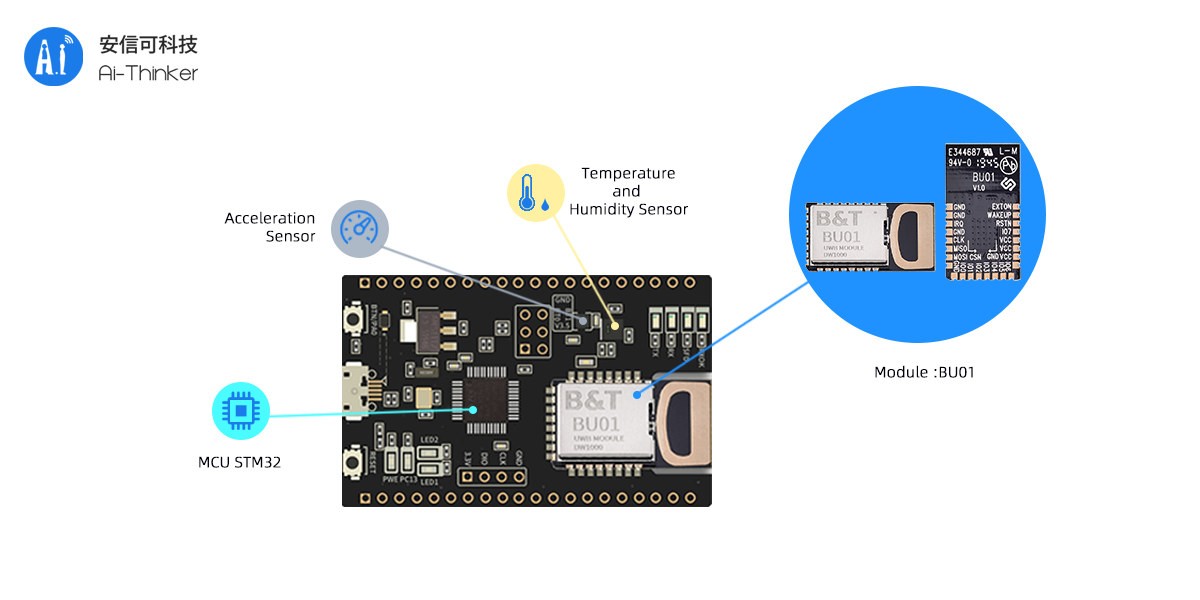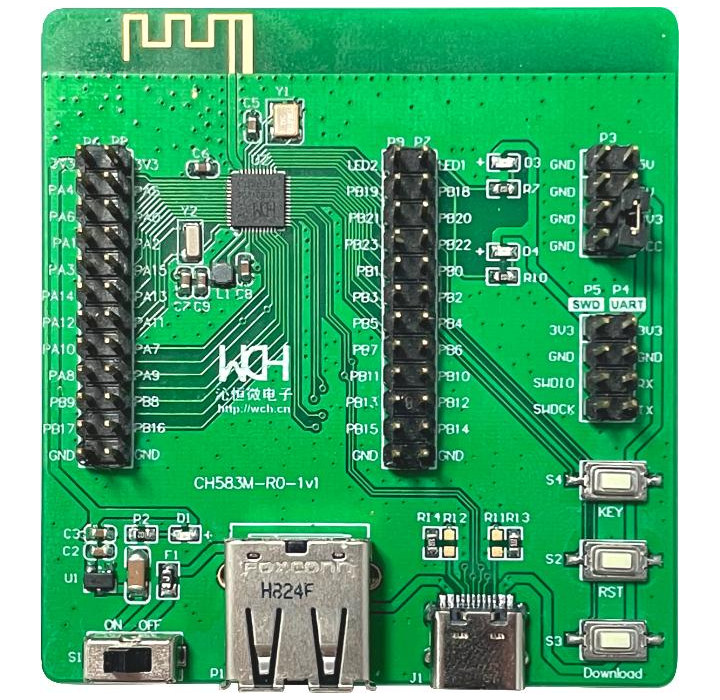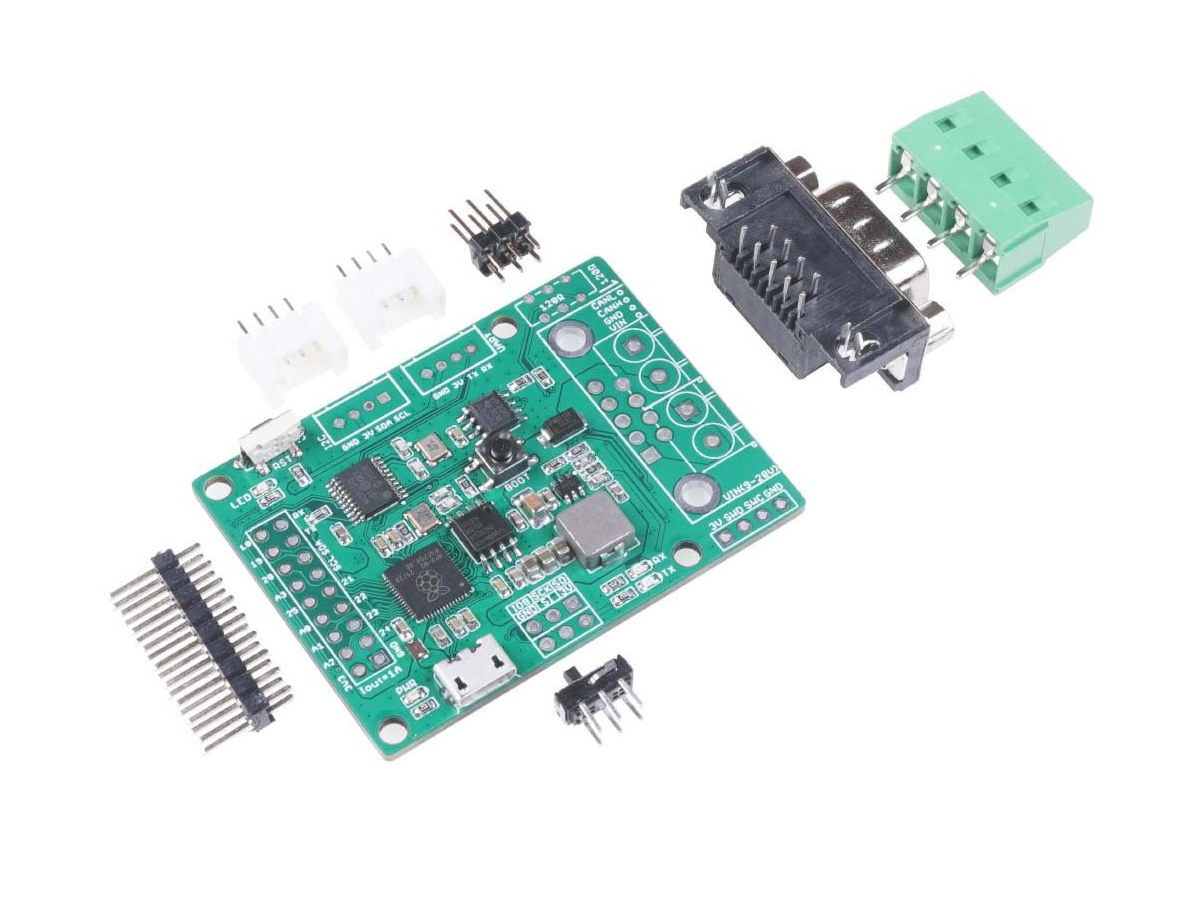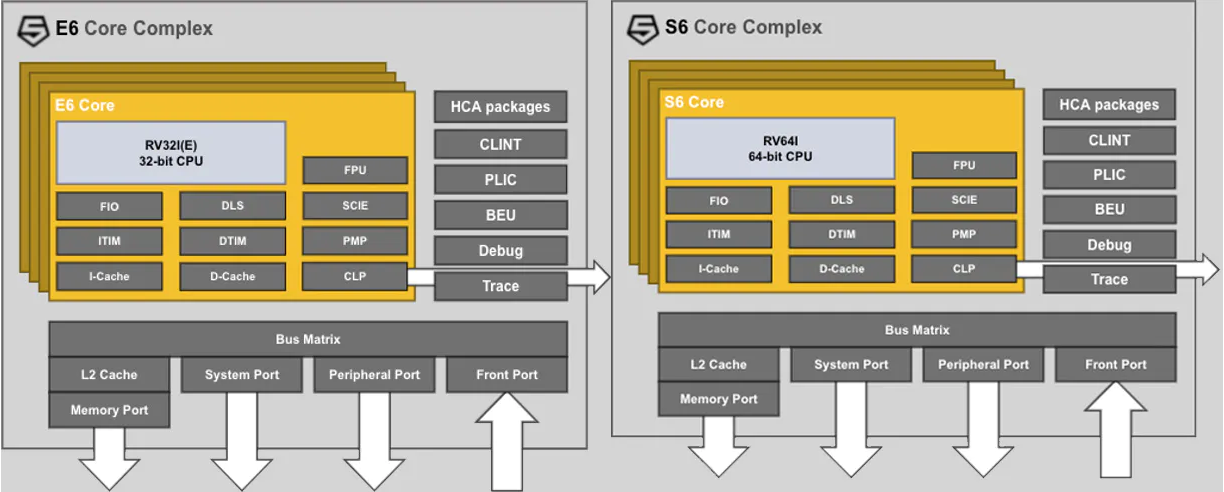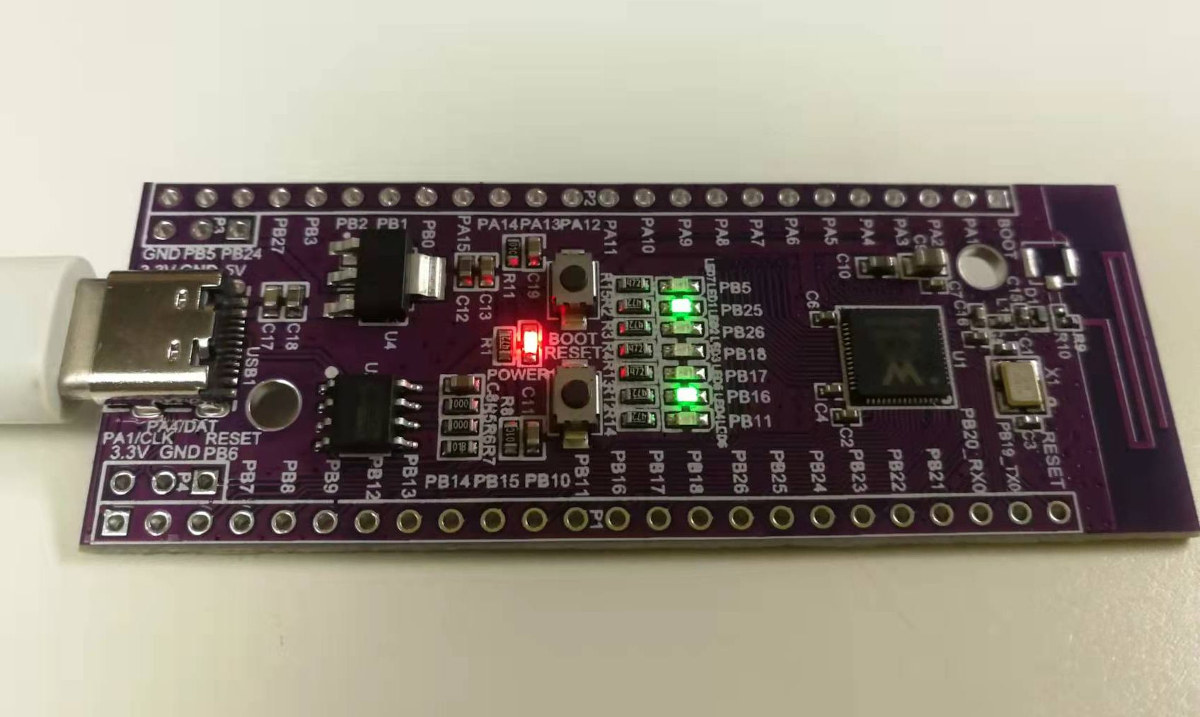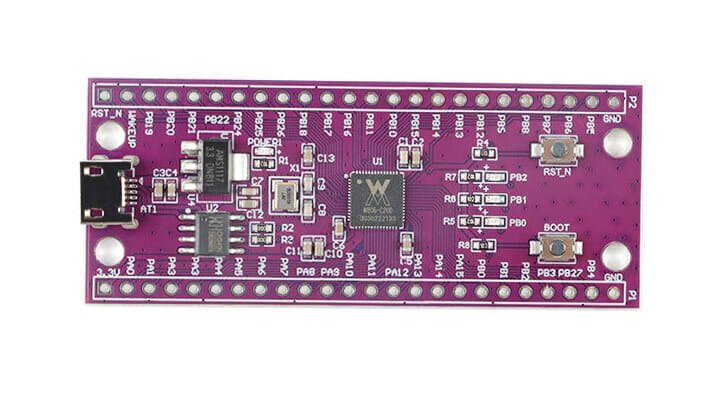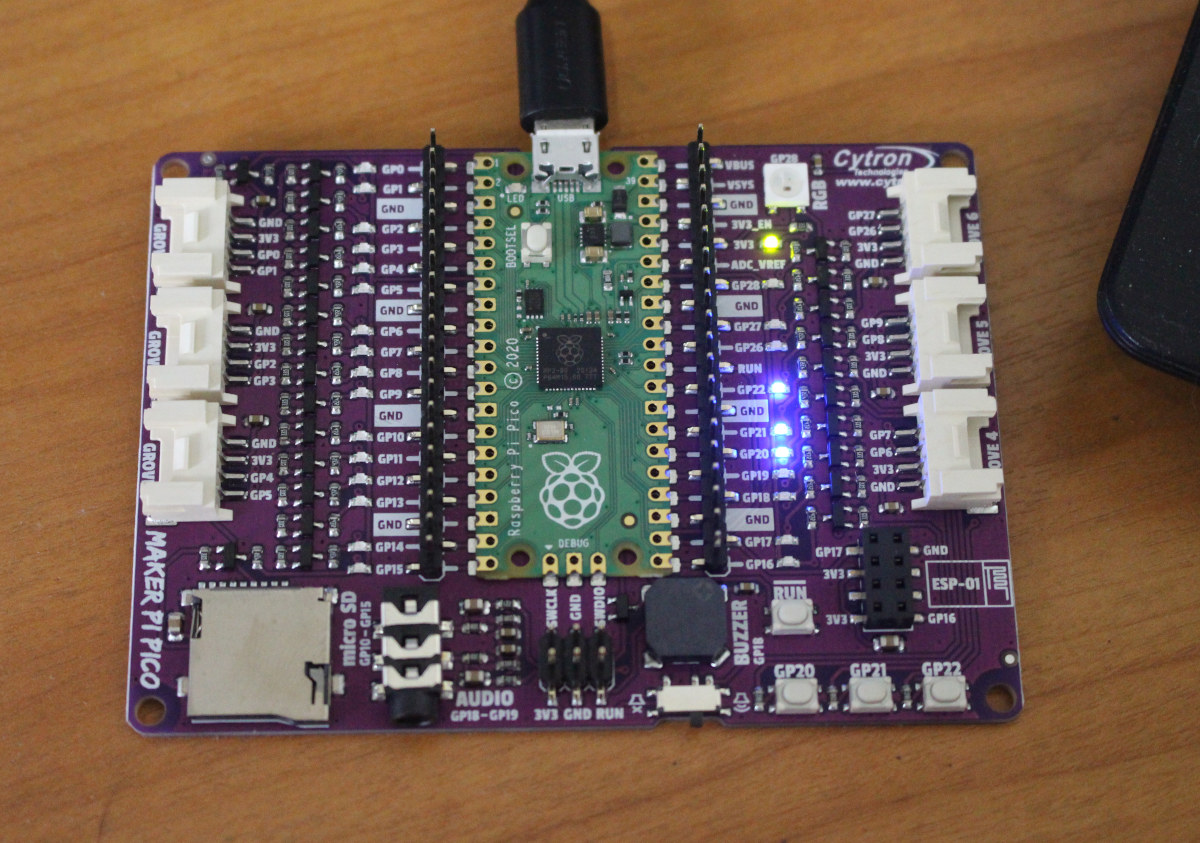GPS is available for outdoor positioning, what about indoors? There is a positioning technology that is more accurate than GPS: UWB. The technology offers positioning accuracy within 10cm which greatly compensates for the shortcomings of the indoor RSSI positioning of past IoT products. UWB technology is a wireless carrier communication technology that uses a frequency bandwidth above 1 GHz. It does not use a sinusoidal carrier but uses nanosecond-level non-sinusoidal narrow pulses to transmit data and occupies a large frequency spectrum, hence the name “Ultra-Wideband”, or UWB for shorts. Besides positioning, UWB can also be used for data transmission with a rate of hundreds of megabits per second. BU01 development board features MCU – STMicro STM32F103 Arm Cortex-M3 microcontroller UWB module – Ai-Thinker BU01 module 50 I/O pins exposed for functions. Sensors – Onboard acceleration sensor, temperature, and humidity sensor Misc – User buttons and LED Power Supply – 5V […]
CH583 RISC-V microcontroller supports Bluetooth 5.3 LE
Following up on the CH572 RISC-V BLE microcontroller with 10KB SRAM, WCH has now introduced the CH583 RISC-V microcontroller with 32KB SRAM, 1 MB flash, and support for the latest Bluetooth 5.3 LE standard. The new microcontroller also offers a wide range of peripherals with two USB host/device interfaces, up to 40 GPIOs, four UART, two SPI, one I2C, up to 14 ADC interfaces, and more. WCH also offers CH581 and CH582 microcontrollers with a different minimum input voltage, less storage (256KB for CH581) and/or peripherals. CH581, CH582, CH583 specifications: MCU core – 32-bit RISC processor WCH RISC-V4A with RV32IMAC instruction set Memory – 32 KB SRAM Storage – 512KB non-volatile storage FlashROM: 448KB user application program memory area CodeFlash 32KB user non-volatile data memory area DataFlash 24KB system boot program memory area BootLoader 8KB system non-volatile configuration information memory area InfoFlash BLE Connectivity Bluetooth Low Energy (BLE) v5.3 Integrated […]
CANBed Raspberry Pi RP2040 board supports CAN Bus, OBD-II protocol
We previously wrote about adding CAN Bus to Raspberry Pi Pico with CANpico expansion board. CANBed is a single board with a Raspberry Pi RP2040 microcontroller and a Microchip MCP2551 CAN receiver plus some extra I/Os that offers an alternative. CANBed supports the CAN 2.0 and OBD-II protocols via either a DB9 connector or a 4-pin terminal block, offers two 4-pin Grove headers and an extra I/O header for expansion, as well as 9-28V power input. CANbed specifications: MCU – Raspberry Pi RP2040 dual-core Cortex-M0+ microcontroller @ up to 133 MHz with 264KB SRAM Storage – 2MB SPI flash CAN 2.0 or OBD-II interface via DB9 port or 4-pin terminal block via Microchip MCP2551 CAN transceiver, 120 Ohm terminal resistor. USB – 1x Micro USB port for programming Expansion 2x Grove header (I2C + UART) SPI header 18-pin header with GPIO, UART, I2C, 4x analog inputs, 5V, GND Misc – […]
Sifive Essential 6-Series RISC-V processors target Linux, real-time applications
SiFive has been busy. Just a few days after SiFive Performance P650 announcement, the company has announced the SiFive Essential 6-Series RISC-V processor family starting with four 64-bit/32-bit real-time core, and two Linux capable application cores, plus the SiFive 21G3 release with various improvements to existing families. SiFive Essential 6-Series range of RISC-V processors There Essential 6-Seris family is comprised of three sub-families with two processors each: E6 Series with 1.91 DMIPS/MHz, 3.69 CoreMark/MHz E61-MC – Quad-core 32-bit embedded processor E61 – Mid-range performance 32-bit embedded processor (one-core) S6 Series with 2.07 DMIPS/MHz, 3.73 CoreMark/MHz S61-MC – Quad-core 64-bit embedded processor S61 – Mid-range performance 64-bit embedded processor (one-core) U6 Series with 2.07 DMIPS/MHz, 3.73 CoreMark/MHz U64-MC – Quad-core 64-bit application processor U64 – Mid-range performance Linux-capable processor (one-core) E6-Series and S6 Series real-time processors have practically the same features except for the 32-bit and 64-bit cores, and a different […]
HLK-W801 board features Alibaba Xuantie XT804 based MCU with WiFi 4, Bluetooth LE 4.2
Earlier this month, we wrote about the 240 MHz WinnerMicro W806 Alibaba Xuantie XT804 C-Sky microcontroller with 1MB flash, 288KB SRAM found in the $2 HLK-W806 development board. But the company has a nearly identical WinnerMicro W801 microcontroller that bumps the internal flash to 2MB, and more importantly adds a 2.4 GHz radio with WiFi 4 and Bluetooth LE 4.2 connectivity, and HiLink also released the HLK-W801 board that’s nearly identical to HLK-W806, except for some extra LEDs, a USB-C port instead of a Micro USB port, and a longer form factor to make space for the PCB antenna. HLK-W801 board specifications: MCU – WinnerMicro W801 32-bit Alibaba XT804 microcontroller @ 240 MHz with 2MB Flash, 288KB RAM, FPU, DSP, crypto engine, 2.4 GHz radio Connectivity 802.11b/g/n WiFi 4 up to 150 Mbps supporting station, soft AP and station+soft AP modes, WPA2 security Bluetooth 4.2 Expansion – 2x 24-pin headers […]
Only 3 days left to get a Raspberry Pi RP2040 + ESP32 board at 80% discount (Sponsored)
There’s always a bunch of DIY electronics on Kickstarter, but right now nothing is as compelling as UDOO KEY. Built by UDOO, a multidisciplinary team that has already completed (and delivered) four highly successful Kickstarter projects, UDOO KEY is an innovative, never-before-seen combination of Raspberry Pi RP2040 and ESP32. Mind you: unlike the newest microcontroller by Arduino, UDOO KEY doesn’t simply use the ESP32 for connectivity. Instead, it features a fully programmable ESP32, offering the widest set of options in the field when it comes to Edge AI. Predictive maintenance, sound recognition, keyword recognition, gesture recognition, face recognition, object detection & classification… these are just a few of the many applications you can build, also thanks to the several programming languages and libraries supported, such as Micropython, C, C++, TensorFlow Lite and TinyML. This is not some fancy mini PC for low-budget gaming, but a platform for AI at the […]
WinnerMicro W806 240 MHz MCU finds it way into a $2 development board
I’ve just been notified about an inexpensive board (HLK-W806) based on WinnerMicro W806 32-bit XT804 (XuanTie E804) microcontroller clocked at up to 240 MHz and equipped with 1MB flash and 288KB RAM. XuanTie is the microcontroller family from Alibaba’s subsidiary T-Head Semiconductor, notably XuanTie RISC-V cores, but I’ve just learned not all XuanTie cores are based on the RISC-V architecture, and as we’ll see below, Xuantie E804 core appears to be based on the C-Sky architecture. It may still be interesting, as it’s in the STM32 board price range (pre-2020), but with a much higher frequency, so let’s have a look. HLK-W806 development board specifications: MCU – WinnerMicro W806 32-bit XT804 microcontroller @ 240 MHz with 1MB Flash, 288KB RAM, FPU, DSP, crtypto engine Expansion – 2x 24-pin headers with (based on MCU specs) 1x SDIO host with support for SDIO 2.0, SDHC, MMC 4.2 1x SDIO device up to […]
Giveaway Week – Maker Pi Pico board
If you have not played with Raspberry Pi Pico board, here’s an opportunity, as the third prize of our giveaway week is the Maker Pi Pico board fitted with the Raspberry Pi RP2040 MCU board, and providing easy access to I/Os with headers and Grove connector, plus a buzzer, an audio jack, and a MicroSD card socket for people needing storage. I reviewed the Maker Pi Pico board with CircuitPython, and it was more convenient than the bare Raspberry Pi Pico thanks to the reset button and an LED is assigned for each I/O. You could also add an ESP-01 module for WiFi connectivity since there’s an 8-pin header for that purpose. The CNXSoft signature on the back of the board clearly brings infinite value to the board. It’s just like an NFT, except it’s real ;). If you don’t think so, you could always use some alcohol to wipe […]


